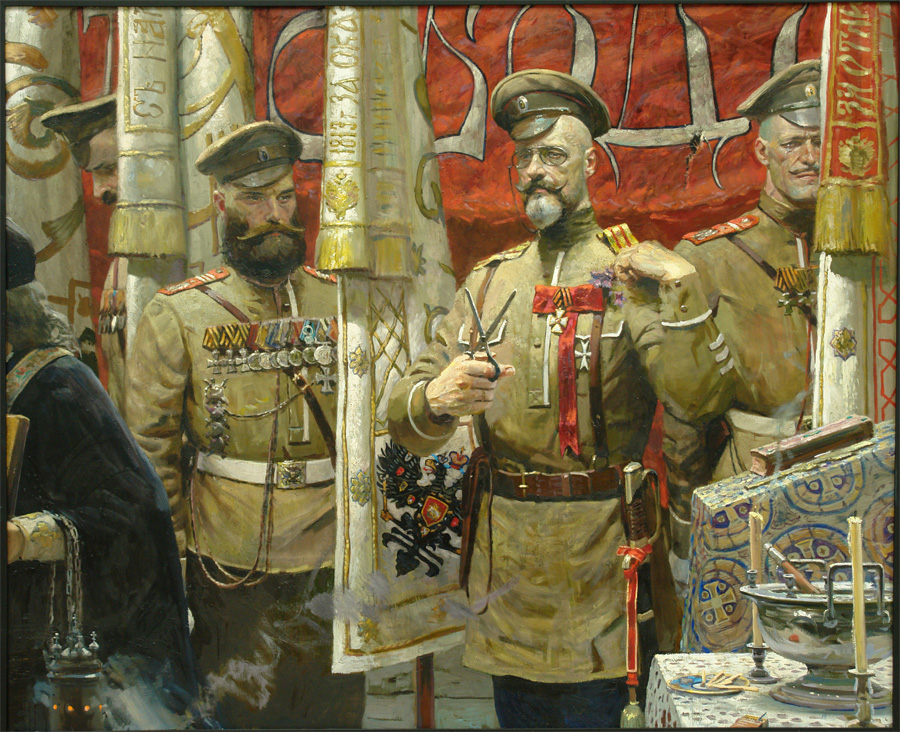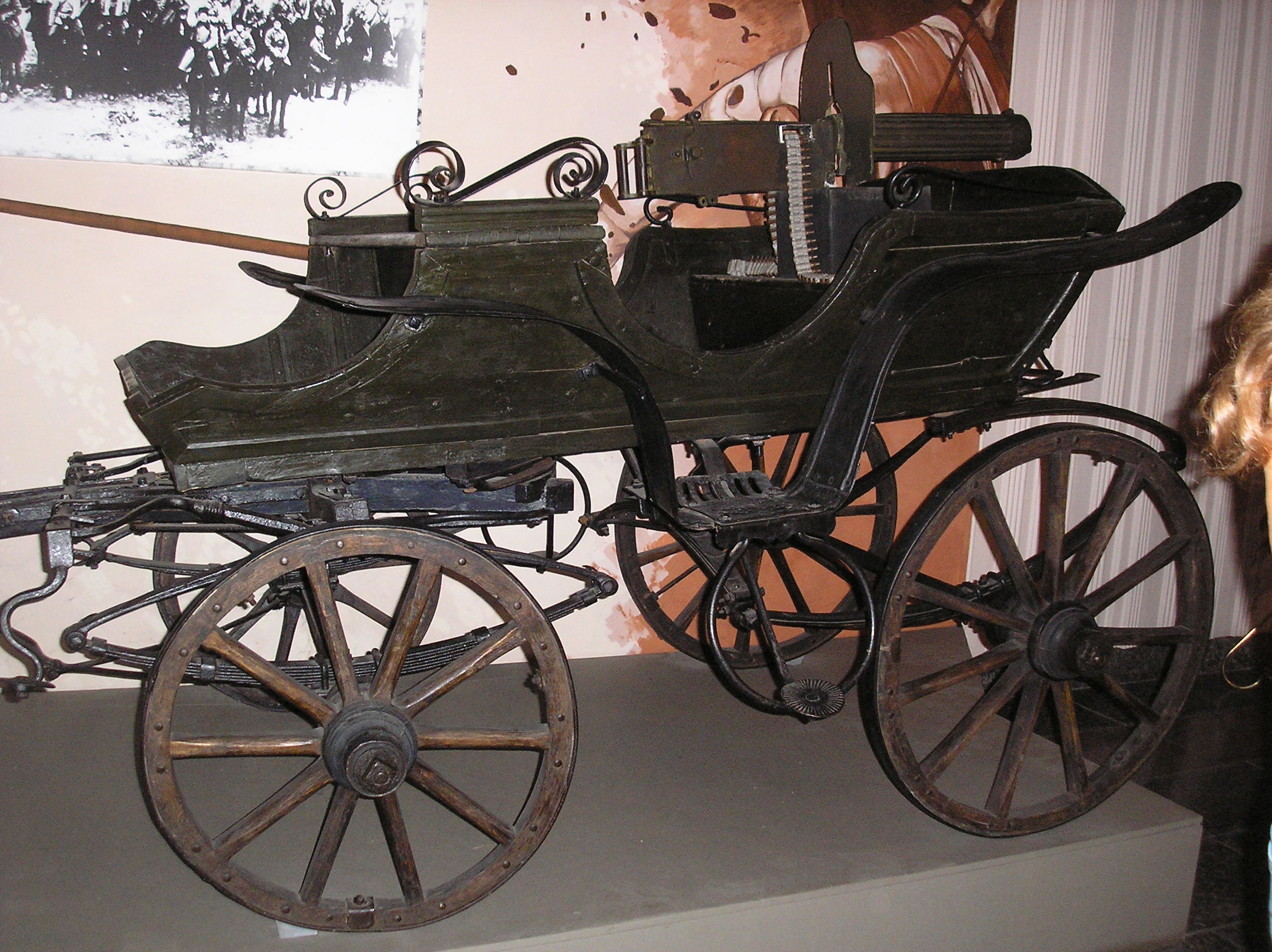|
Volunteer Army
The Volunteer Army (; ), abbreviated to (), also known as the Southern White Army was a White Army active in South Russia during the Russian Civil War from 1917 to 1920. The Volunteer Army fought against Bolsheviks and the Makhnovists on the Southern Front and the Ukrainian War of Independence. On 8 January 1919, it was made part of the Armed Forces of South Russia, becoming the largest force of the White movement until it was merged with the Army of Wrangel in March 1920. History Formation The Volunteer Army began forming in November/December 1917 under the leadership of General Mikhail Alekseyev and General Lavr Kornilov in Novocherkassk, shortly after the Russian Civil War began following the October Revolution. It organized to fight against the Bolsheviks in South Russia. Alekseyev and Kornilov enlisted supporters, which initially included volunteering officers, cadets, students, and Cossacks. Of the first 3,000 recruits, only twelve were ordinary soldiers; the ... [...More Info...] [...Related Items...] OR: [Wikipedia] [Google] [Baidu] |
Reforms Of Russian Orthography
Russian orthography has been reformed officially and unofficially by changing the Russian alphabet over the course of the history of the Russian language. Several important reforms happened in the 18th–20th centuries. Early changes Old East Slavic adopted the Cyrillic script, approximately during the 10th century and at about the same time as the introduction of Eastern Christianity into the territories inhabited by the Eastern Slavs. No distinction was drawn between the vernacular language and the liturgical, though the latter was based on South Slavic languages, South Slavic rather than East Slavic languages, Eastern Slavic norms. As the language evolved, several letters, notably the ''yuses'' (Ѫ, Ѭ, Ѧ, Ѩ) were gradually and unsystematically discarded from both secular and church usage over the next centuries. The emergence of the centralized Russian state in the 15th and 16th centuries, the consequent rise of the state bureaucracy along with the development of the com ... [...More Info...] [...Related Items...] OR: [Wikipedia] [Google] [Baidu] |
Alexander Kutepov
Alexander Pavlovich Kutepov (; 28 September 1882 – 26 January 1930) was a Russian military officer in the Imperial Russian Army and later an anti-communist officer in the Volunteer Army during the Russian Civil War. From 1928 to 1930, he chaired the Russian All-Military Union (ROVS).Зинкевич М. МГенерал Александр Павлович Кутепов- "В течение трёх лет, с конца 1917 и по ноябрь 1920 года, на наших глазах полковник Кутепов вырос в незаурядного начальника крупных войсковых соединений и администратора. ..После смерти генерала, барона П.Н. Врангеля и Великого Князя Николая Николаевича генерал Кутепов стал во главе Русского Обще-Воинского Союза." He was assassinated after being abducted by OGPU ag ... [...More Info...] [...Related Items...] OR: [Wikipedia] [Google] [Baidu] |
Private (rank)
A private is a soldier, usually with the lowest Military rank, rank in many armies. Soldiers with the rank of private may be conscription, conscripts or they may be professional (career) soldiers. The term derives from the term "private soldier". "Private" comes from the Latin word ''privus'' or perhaps ''privo'' that meant an individual person and later an individual without an Official (other), office. Asia Indonesia In Indonesia, this rank is referred to as ''Tamtama'' (specifically ''Prajurit'' which means soldier), which is the lowest rank in the Indonesian National Armed Forces. In the Indonesian Army, Indonesian Marine Corps, and Indonesian Air Force, "Private" has three levels, which are: Private (''Prajurit Dua''), Private First Class (''Prajurit Satu''), and Chief Private (''Prajurit Kepala''). After this rank, the next promotion is to Corporal. File:prada pdh ad.png, Private (''Prajurit Dua'') File:pratu pdh ad.png, Private First Class (''Prajurit Satu'') ... [...More Info...] [...Related Items...] OR: [Wikipedia] [Google] [Baidu] |
Cossacks
The Cossacks are a predominantly East Slavic languages, East Slavic Eastern Christian people originating in the Pontic–Caspian steppe of eastern Ukraine and southern Russia. Cossacks played an important role in defending the southern borders of Ukraine and Russia, Cossack raids, countering the Crimean-Nogai slave raids in Eastern Europe, Crimean-Nogai raids, alongside economically developing steppes, steppe regions north of the Black Sea and around the Azov Sea. Historically, they were a semi-nomadic and semi-militarized people, who, while under the nominal suzerainty of various Eastern European states at the time, were allowed a great degree of self-governance in exchange for military service. Although numerous linguistic and religious groups came together to form the Cossacks, most of them coalesced and became East Slavic languages, East Slavic–speaking Eastern Orthodox Church, Orthodox Christians. The rulers of the Polish–Lithuanian Commonwealth and Russian Empire en ... [...More Info...] [...Related Items...] OR: [Wikipedia] [Google] [Baidu] |
Cadet
A cadet is a student or trainee within various organisations, primarily in military contexts where individuals undergo training to become commissioned officers. However, several civilian organisations, including civil aviation groups, maritime organisations, and police services, also designate their trainees as cadets. Armed forces In several military services, cadets, flight cadets, officer cadets, and gentleman/lady cadets may refer to recruits and students that are undergoing military training to become commissioned officers. The specific rank structure and responsibilities of cadets can vary among different military organisations. Australia In Australia, a cadet is an officer in training. The official rank is Officer Cadet (OCDT for members of the Australian Regular Army and OFFCDT for members of the Royal Australian Air Force), but OCDTs in the Royal Military College–Duntroon are referred to as ''staff cadet'' (Scdt) for historical reasons. Austria-Hungary In Austr ... [...More Info...] [...Related Items...] OR: [Wikipedia] [Google] [Baidu] |
Officer (armed Forces)
An officer is a person who holds a position of authority as a member of an Military, armed force or Uniformed services, uniformed service. Broadly speaking, "officer" means a commissioned officer, a non-commissioned officer (NCO), or a warrant officer. However, absent contextual qualification, the term typically refers only to a force's ''commissioned officers'', the more senior members who derive their authority from a Commission (document), commission from the head of state. Numbers The proportion of officers varies greatly. Commissioned officers typically make up between an eighth and a fifth of modern armed forces personnel. In 2013, officers were the senior 17% of the British armed forces, and the senior 13.7% of the French armed forces. In 2012, officers made up about 18% of the German armed forces, and about 17.2% of the United States armed forces. Historically armed forces have generally had much lower proportions of officers. During the First World War, fewer than ... [...More Info...] [...Related Items...] OR: [Wikipedia] [Google] [Baidu] |
October Revolution
The October Revolution, also known as the Great October Socialist Revolution (in Historiography in the Soviet Union, Soviet historiography), October coup, Bolshevik coup, or Bolshevik revolution, was the second of Russian Revolution, two revolutions in Russia in 1917. It was led by Vladimir Lenin's Bolsheviks as part of the broader Russian Revolution of 1917–1923. It began through an insurrection in Petrograd (now Saint Petersburg) on . It was the precipitating event of the Russian Civil War. The initial stage of the October Revolution, which involved the assault on Petrograd, occurred largely without any casualties. The October Revolution followed and capitalized on the February Revolution earlier that year, which had led to the abdication of Nicholas II and the creation of the Russian Provisional Government. The provisional government, led by Alexander Kerensky, had taken power after Grand Duke Michael Alexandrovich of Russia, Grand Duke Michael, the younger brother of ... [...More Info...] [...Related Items...] OR: [Wikipedia] [Google] [Baidu] |
Novocherkassk
Novocherkassk () is a types of inhabited localities in Russia, city in Rostov Oblast, Russia, located near the confluence of the Tuzlov and Aksay Rivers, the latter a distributary of the Don (river), Don River. Novocherkassk is best known as the cultural capital of the Cossacks, and as the official capital of the Don Cossacks. Population: History Imperial era Foundation Although the first settlement in the region was founded by Temryuk of Kabardia, Temroqwa Idar,Khasht, Ali. ''Circassian Prince Temroqwa Idar.'' the city of Novocherkassk was founded in 1805 by Lieutenant-general Matvei Platov, the Ataman of the Don Cossacks, as the administrative center of the Don Host Oblast. It was established in reaction to the original administrative center, the ''stanitsa'' of Starocherkasskaya, Cherkassk, being deemed unsuitable as the capital for the Don Cossacks for several reasons. Cherkassk was repeatedly flooded for long periods of time due to its low-lying location on the banks of the ... [...More Info...] [...Related Items...] OR: [Wikipedia] [Google] [Baidu] |
Army Of Wrangel
The Russian Army (), commonly known as the Army of Wrangel (), was a White Army active in South Russia during the Russian Civil War from March to November 1920. It was officially formed on 28 April 1920 from the merger of several White armies, including the Volunteer Army, in a reorganization of the Armed Forces of South Russia. The Army of Wrangel, nicknamed after its commander General Pyotr Wrangel, fought against Bolshevik forces in the Southern Front and the Ukrainian War of Independence. In November 1920, following defeat at the Siege of Perekop and being vastly outnumbered, the Army of Wrangel organized a successful evacuation from Crimea and subsequently dissolved. Veterans of the army were among the founders of the Russian All-Military Union. Composition The Russian Army had a staff and five Army Corps Corps (; plural ''corps'' ; from French , from the Latin "body") is a term used for several different kinds of organization. A military innovation by Napoleon I, ... [...More Info...] [...Related Items...] OR: [Wikipedia] [Google] [Baidu] |
Revolutionary Insurgent Army Of Ukraine
The Revolutionary Insurgent Army of Ukraine (; RIAU), also known as ''Makhnovtsi'' (), named after their founder Nestor Makhno, was an Anarchism, anarchist army formed largely of Ukrainians, Ukrainian peasants and workers during the Russian Civil War. They protected the operation of "free soviets" and libertarian socialism, libertarian communes by the Makhnovshchina, an attempt to form a Stateless society, stateless Anarcho-communism, anarcho-communist society from 1918 to 1921 during the Ukrainian War of Independence. Terminology "Revolutionary Insurgent Army of Ukraine" is the common translation of the . It is commonly Contraction (grammar), contracted to "Insurgent Army", or "Revolutionary Insurgent Army". This term has less commonly been translated as "Revolutionary Insurrectionary Army of Ukraine" or "Revolutionary Partisan Army of Ukraine", with their own respective contractions "Insurrectionary Army" and "Partisan Army". The Russian Bolshevik politician Victor Serge him ... [...More Info...] [...Related Items...] OR: [Wikipedia] [Google] [Baidu] |
Bolsheviks
The Bolsheviks, led by Vladimir Lenin, were a radical Faction (political), faction of the Marxist Russian Social Democratic Labour Party (RSDLP) which split with the Mensheviks at the 2nd Congress of the Russian Social Democratic Labour Party, Second Party Congress in 1903. The Bolshevik party, formally established in 1912, seized power in Russia in the October Revolution of 1917, and was later renamed the Russian Communist Party, All-Union Communist Party, and ultimately the Communist Party of the Soviet Union. Its ideology, based on Leninism, Leninist and later Marxism–Leninism, Marxist–Leninist principles, became known as Bolshevism. The origin of the RSDLP split was Lenin's support for a smaller party of professional revolutionaries, as opposed to the Menshevik desire for a broad party membership. The influence of the factions fluctuated in the years up to 1912, when the RSDLP formally split in two. The political philosophy of the Bolsheviks was based on the Leninist pr ... [...More Info...] [...Related Items...] OR: [Wikipedia] [Google] [Baidu] |








